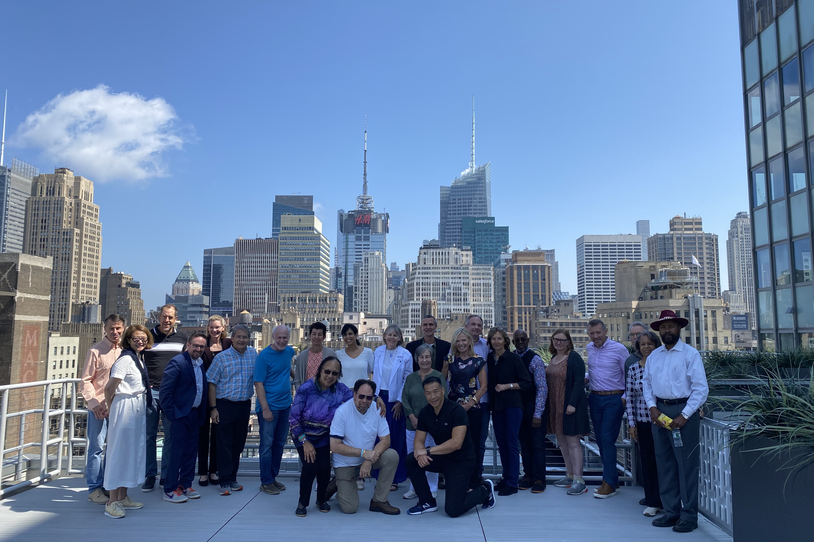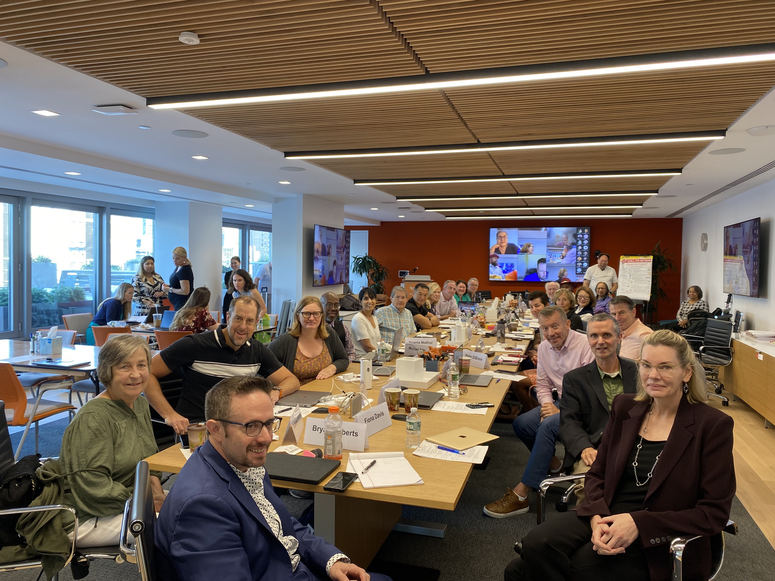
Many people with Parkinson’s disease (PD) wonder, What should I eat or not eat? How should I exercise? What else can or should I do, outside of see my doctor and take my medicine?
The answer: Move as much as possible, eat and sleep as best you can, connect with others in meaningful ways, limit the impacts of stress and avoid potentially harmful exposures (like too much alcohol) where you can.
All easier said than done, especially when living with PD or simply being human, for that matter. These concepts — using daily activities, or one’s lifestyle and behaviors, as treatment tools — are what’s known as “lifestyle medicine.” I board certified in this field so that I can, hopefully, help people with Parkinson’s live better lives and help people with PD risks do all they can to delay or even prevent disease. (Read more.)
To learn how people with Parkinson’s use lifestyle medicine concepts, I spoke with The Michael J. Fox Foundation's (MJFF) Patient Council, a group of 40 people who advise on the Foundation’s strategy, programs and more. Here, their experiences and reflections on lifestyle and Parkinson’s.
Lifestyle Medicine: Mom really was right
Eat your broccoli. Play outside. Go to bed early. Did you hear this growing up? Do you give your children this same advice? There’s a good reason for this time-tested wisdom. These activities — eating well; getting exercise, sunlight and a good night’s sleep; and more — are the foundation of health. They’re also the pillars of lifestyle medicine:
Regular physical activity
Move more throughout the day. And exercise regularly — at least 150 minutes per week of cardio, but don’t forget stretching, strength and balance exercise too. The higher the intensity, the better, but anything is beneficial!
“Sometimes, seeing others practicing the ultra-athlete or ultra-health-eater lifestyle can make me feel a little depressed, like I’m not doing enough. So I focus on small wins. If I can’t exercise the way I want one day, I just do little bits at a time. Small increments are most important for sustained change.” Ethan Henderson – age 54, Tucson, Arizona
“It’s helpful to be part of exercise classes with other PD patients, especially when led by a coach or trainer who has the disease. That way, you can’t ‘Parkinson’s’ your way out of trying hard!” Sebastian Krys – age 52, Woodland Hills, California
Stay tuned for a new MJFF guide on exercise and Parkinson’s in the coming months.
A whole food, plant-forward diet
Focus on food in its natural state, like it looks straight from the ground. Make plants — fruits, veggies, whole grains, beans, legumes — the center of your meals. Limit red meat, sugar and processed foods. Build from the Mediterranean and MIND diets, which have most evidence of benefit in Parkinson’s, to find your own healthy way of eating that honors your tastes, traditions and culture.
“My main motivation for eating properly is to avoid being constipated or taking drugs for constipation. I changed my diet; I eat prunes, I make sure I get enough fiber. Luckily, I like to cook, too. This helps me stay consistent with meals, which helps my digestion stay consistent. I also want to live a long time, so I have to live now in ways that will enable me to do that.” Sheryl Lowenhar – age 61, Scottsdale, Arizona
“I don’t like to cook, so I get healthy meals through a delivery service a few times a week.” Fiona Davis – age 56, New York, New York
Watch an Ask the MD video for more.
Quality sleep
Seven to nine hours of sleep per night is ideal, although you may need a little more or less. Quality, though, is more important than quantity. Good sleep supports your immune (disease-fighting) system, energy levels, memory and thinking and much more. Keep a set bedtime and wind-down routine, and use regular movement, healthy diet and natural light exposure to reinforce sleep rhythm and invite the best sleep possible.
“Sticking to a sleep routine is critical for me. As a single parent, I’d like to stay away from sleep medicine as much as I can. I use the bedtime alarm on my phone — this allows me to set a bedtime and stick with it as best I can.” Bryan Roberts – age 43, Storrs, Connecticut
“We know it’s good stuff, but it’s tough to do. Our doctors — as good as they are and as much as we love them — may not regularly bring these things [lifestyle concepts] up. Or, because they’re experts in medication and other treatments, they may turn to those tools before food, exercise or sleep habit changes.” Bret Parker – age 55, New York, New York
Positive social connections
There are different types of loneliness, such as not feeling emotionally connected or feeling like part of a community. And loneliness is different than social isolation, which is being physically separated from others. You can be happily married or surrounded by a group of people and still feel lonely. Connecting with others, in and outside the PD community, not only lessens loneliness, it also boosts your immune system, eases anxiety and depression, and makes you feel seen and heard.
“There’s a dichotomy of my persona. I’m a verbose introvert. But, since my diagnosis, the introvert has taken over. I’m in my head more and that shuts down the gregarious communicator in me. And that leads to loneliness and depression. It’s a challenge to see that part of yourself change. What helps are my connections to my family and to my community, to the MJFF Patient Council and to the various projects that I care about. My connections serve as a counterbalance to the negative impact that Parkinson’s disease has introduced in my life.” Leonard Chandler – age 74, Helena, Alabama
Connect with others online through MJFF’s Parkinson’s Buddy Network.
Stress management
We all have stress. In people with Parkinson’s, stress can temporarily worsen symptoms and may even impact how disease changes over time. (Ongoing research aims to learn more.) We can’t make stress go away, but we can limit its effects. Meditation is a popular tool, but it’s not the only one. You can create (paint, play piano, journal), walk in nature, dance to your favorite music, or do something entirely different. Try different activities to see what works best for you.
“I write poetry, keep a daily gratitude journal, and make art. I’m mindful while walking, taking in the environment. I do starfish breathing when I’m stressed. (Starfish breathing is tracing up your thumb while inhaling, holding your breath at the tip, and breathing out while tracing down the other side. Repeat on all fingers of one hand for five deep breaths.) I focus on connections and joyfulness, and what’s available to me in any given moment.” Denise Coley – age 71, Morgan Hill, California
“My mindfulness is being in nature. Allow yourself to be alone on a walk. Listen to the birds. Or just scan your body — start with your toes and work your way up, acknowledge yourself, how you’re feeling.” Larry Gifford – age 51, Vancouver, British Columbia
Avoidance of harmful substances
Try to fuel your body in the healthiest ways you can. Eat whole foods, drink lots of water and limit or avoid harmful substances, like tobacco, too much alcohol (more than one drink a day for women or two drinks per day for men) or excess sugar. And look closely at your environment, which plays a role in Parkinson’s — can you limit exposure to or impact of pesticides, chemicals, air pollution and other factors?
“Finding the middle point is critical when it comes to lifestyle changes. There’s an angel on one shoulder and devil on the other. Each of our families has customs and traditions, we’re not going to avoid them. There are ways to adapt, you just have to work to find the balance.” Claudia Revilla – age 58, Spring, Texas
“I never say no to sugar when I need it. But I’ve been able to fall in love with lifestyle medicine by ‘forcing’ a healthy way of living to kick start my journey. Then I reset or refresh once a year.” Wanda Kim Lilley – age 63, London, United Kingdom
“There might be a time when I visit a new place or go out for a big meal with a friend. In those times, nothing I eat may be ‘good’ for me. But I enjoy the company. And that’s good for me.” Jimmy Choi – age 47, Bolingbrook, Illinois

